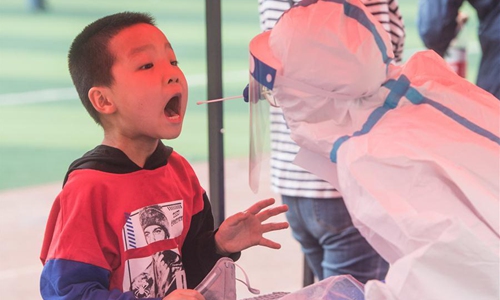Beijing residents rush to take COVID-19 tests, as city tries to stifle new outbreak
By GT staff reporters Source:Global Times Published: 2020/6/17 18:08:40

A child takes the nucleic acid test at a testing post set up at a primary school in Dongxihu District in Wuhan, central China's Hubei Province, May 15, 2020. Wuhan will arrange nucleic acid tests for all residents who have not been tested before, in order to better know the number of asymptomatic cases of the novel coronavirus. The decision was made as the virus-ravaged city continued to report daily increases of asymptomatic infections, which raised concerns among the public. (Xinhua/Xiao Yijiu)
As demand for nucleic acid tests surges in Beijing amid the latest COVID-19 outbreak, pressure is mounting on local medical care providers. Experts say residents not in high-risk communities should opt for tests at private third-party facilities to prevent cross infections and avert straining the city's public health care system.
"The latest outbreak has unnerved me and I decided to take a test. I called almost 30 testing institutions Wednesday morning, but most of the lines were busy and I was told that I need to wait for about a week," a Beijing resident surnamed Yang living in the Haidian district told the Global Times.
"My company booked tests from a third-party testing institution for all employees, and we took the tests on Tuesday. Now we are waiting for the results," said a white-collar worker surnamed Chen in the downtown Xicheng district.
Local government said Beijing has done 365,000 nucleic tests as of Wednesday afternoon. The city reported 31 new confirmed COVID-19 cases on Wednesday, bringing the total infections to 137 since the new outbreak began on June 11.
Local nucleic acid test providers have received increased orders following the latest outbreak stemming from the Xinfadi wholesale food market in Beijing's southwestern Fengtai district.
"Orders for nucleic acid test kits from Beijing have continued to surge in recent days as local hospitals and labs are snapping up the products," an insider at the Shanghai BioGerm Medical Biotechnology Co told the Global Times on Wednesday.
"We shipped all we had to Beijing in the past few days," she said, adding that demand is now similar to its level during the height of the previous outbreak in January and February.
"The increased supply for Beijing will not affect our supply for other provinces," she said, noting that the firm's daily output exceeds 500,000 units.
To help improve the testing capacity at BGI's Beijing outlets, the company rushed a batch of testing equipment to the capital, Shenzhen-based BGI Genomics told the Global Times on Wednesday.
The equipment, including biological safety cabinets and automated nucleic acid extractors, arrived in Beijing on Monday, the firm said, noting: "We have improved testing capacity to 10,000 samples a day from the previous 2,000 samples." Since March 30, BGI's daily output of nucleic acid test kits has hit nearly 2 million.
China's disease control and prevention center on Wednesday re-launched its mobile P3 laboratory to assist COVID-19 testing in Beijing. The laboratory can test up to 1,000 people a day. It has been sent to different parts of China including Wuhan, the city in Central China's Hubei Province hardest hit by the coronavirus in January and February.
The number of institutions qualified to carry out nucleic acid tests in Beijing stands at 98, with a maximum daily testing capacity of 90,000 people, according to Beijing health authorities.
Experts said that Beijing is expected to improve its daily testing capacity to meet surging demand. That would include the establishment of more third-party testing institutions, they said.
Beijing on Tuesday night raised its COVID-19 emergency response status from level 3 to level 2.
At level 2, those leaving Beijing need to hold a negative COVID-19 nucleic acid test certificate issued within seven days of departure.
The capital's new outbreak has raised public doubts over whether all Beijing residents should take nucleic acid tests. Wu Zunyou, chief epidemiologist at the Chinese Center for Disease Control and Prevention, said on Tuesday that the tests are an effective and fast method of detecting infections but there is no need to conduct a large-scale screening of residents in Beijing.
People required to undergo testing include those who have been in close contact with a confirmed case or those connected to the Xinfadi wholesale food market, Wu said.
People not in high-risk areas of Beijing who haven't developed any symptoms should preorder third-party tests rather than visiting hospitals to avoid cross infections and straining the city's public medical care system, Zhou Zhengguo, an independent industry analyst, told the Global Times on Wednesday.
Zhou predicted it would not be possible to test everyone in the city as the cost would be too high.
A Beijing virus control and prevention working group recently released a notice to relevant residents in the city, informing them that they would be called on to take the tests in an orderly manner. "Those who voluntarily take tests should preorder them before they go to authorized test institutions."